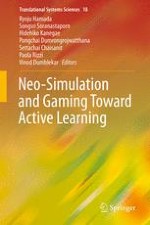2019 | OriginalPaper | Chapter
Experience Design for Understanding Social Withdrawal: Employing a Live-Action Role-Play (LARP) to Learn About and Empathize with Hikikomori in Japan
Author : B.-O. Kamm
Published in: Neo-Simulation and Gaming Toward Active Learning
Publisher: Springer Nature Singapore
Activate our intelligent search to find suitable subject content or patents.
Select sections of text to find matching patents with Artificial Intelligence. powered by
Select sections of text to find additional relevant content using AI-assisted search. powered by
